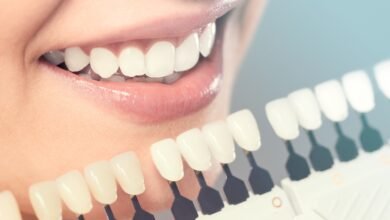What Does Your Dental Teeth Numbering Chart Mean?

If you’ve been curious about your teeth numbers chart, you’re not alone! It can be hard to decipher exactly what each set of numbers on your dental chart mean, and that’s where we come in! The chart below should help you understand your teeth numbering more thoroughly, and it will include helpful guidelines from your dentist as well. If you have any questions, don’t hesitate to call our office and ask!
How To Find Your Tooth Number
- The first step is to find a dental tooth number chart. You can ask your dentist for one, or look for one online.
- Once you have the chart, take a close look at it. You’ll notice that each tooth has a number assigned to it.
- The numbers on the chart correspond to the teeth in your mouth. The top row of teeth, starting with your left canine (cuspid) tooth, is numbered 1-16.
- The bottom row of teeth, starting with your right canine tooth, is numbered 17-32.
- If you’re looking at the chart and having trouble finding a specific tooth, don’t worry! Many people do.
How To Read Your Dental Teeth Chart
If you’ve ever been to the dentist, you’ve probably seen the dental tooth number chart. But what does it all mean? The chart is actually a really simple way to help dentists and hygienists identify each tooth in your mouth. Here’s how to read it
How To Use Your Dental Teeth Chart Effectively
Your dental teeth chart is a helpful tool that can be used to ensure you’re brushing and flossing all of your teeth correctly. Here’s how to use it:
- Find the tooth number chart online or in a dental office.
- Locate your tooth on the chart.
- Note the quadrant that your tooth is located in.
- Remember that the quadrants are numbered 1-4, starting from the upper right corner of your mouth and going clockwise.
- Find the corresponding number on the chart for that quadrant.
- Use the dental tooth number chart to help you keep track of which teeth you’ve brushed and flossed, and which ones you still need to clean!
The Importance Of Brushing And Flossing
We all know that we should brush and floss our teeth every day, but do you know why? Brushing and flossing are important because they remove plaque from your teeth. Plaque is a sticky film of bacteria that forms on your teeth and can cause cavities. When you brush your teeth, you remove the plaque from your teeth. Flossing helps remove plaque from in between your teeth, where your toothbrush can’t reach.
How Long Should You Brush And Floss Daily?
It’s important to brush and floss your teeth every day to remove plaque and bacteria that can cause tooth decay and gum disease. Depending on how much time you have, you should brush for at least two minutes and floss for at least one minute.
Why We Need An Electric Toothbrush
If you’ve ever wondered why we need an electric toothbrush, this blog post is for you. We’ll explore the many benefits of using an electric toothbrush, including its ability to remove plaque and bacteria, as well as its ability to whiten teeth. We’ll also discuss how electric toothbrushes can be more gentle on your gums and help to prevent gum disease. So if you’re considering making the switch to an electric toothbrush, read on to learn more about what they can do for your oral health!
Is A Soft Bristle Or Medium Bristle Toothbrush Better?
There’s a lot of debate over which type of toothbrush is better for your teeth. Soft bristle toothbrushes are often recommended by dentists because they’re gentle on your gums and can help remove plaque without damaging your enamel. Medium bristle toothbrushes are also effective at removing plaque, but some people find them too harsh on their gums. Ultimately, it’s up to you to decide which type of toothbrush is best for your own oral health.
Benefits Of Having The Best Electric Toothbrush
When it comes to dental care, having the best electric toothbrush can make a big difference. Not only will it help you keep your teeth clean and healthy, but it can also save you time and money in the long run. Here are some of the top benefits of having the best electric toothbrush
Is There A Correlation Between Periodontal Disease And Dementia?
According to a recent study, there may be a correlation between periodontal disease and dementia. The study found that people with periodontal disease were more likely to develop dementia than those without the disease. While the exact cause of this link is not yet known, it is believed that the inflammation caused by periodontal disease may contribute to the development of dementia. If you have periodontal disease, it is important to get treatment to help reduce your risk of developing dementia.
Brushing with an electric toothbrush can help reduce bacteria in your mouth. A study published in Applied Microbiology & Biotechnology Journal shows how having more bacteria in your mouth can increase your risk of developing cardiovascular disease, diabetes, stroke, etc. An electric toothbrush can reduce this risk because it provides you with better oral hygiene.



